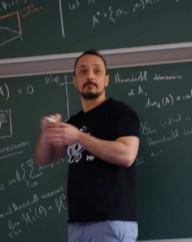Monday 5 September 2022, 9:00 – 12:30
T1. Reconfigurable Intelligent Surfaces: A Joint Localization and Communication Perspective
Speaker: Andrea Abrardo, University of Siena (Italy)
Abstract: One of the main design and implementation challenges of RIS-assisted communication systems is the need of estimating the channel state information (CSI) of the transmitter-RIS and RIS-receiver channels. Indeed, since all RIS elements are passive, i.e., they cannot transmit, receive, or process any pilot signal, CSI estimation can only be performed by a central controller (e.g., the BS) at the expenses of a huge increase of the number of pilots needed to estimate the channel with respect to standard MIMO systems. Moreover, since RISs configuration can only be decided at the BS, a huge amount of information is needed for appropriately configuring (virtually in real-time) the operation of the RIS via a feedback channel. Hence, the overhead associated with the channel estimation and reporting phases through a feedback channel may severely offset the performance gains introduced by a RIS. Motivated by these considerations, the tutorial will first provide an introduction to channel modeling in MIMO communications and CSI estimation in massive MIMO systems and in RIS-assisted MIMO scenarios. Hence, a CSI-free RIS optimization strategy based on only the statistical characterization of the locations of the mobile users is presented. More specifically, the presented approach does not require the estimation of either instantaneous channel state information or second-order channel statistics, thus significantly relaxing (or even avoiding) the need of frequently reconfiguring the RISs. The preliminary results obtained by this study show that RIS-assisted wireless systems that are optimized based on statistical position information still provide large performance gains as compared to the baseline scenarios in which no RISs are deployed. Finally, the possibility of performing joint RIS-assisted users localization and RISs optimization, thus addressing two 6G KPIs (i.e., higher bit rate and better positioning), will be discussed. It will be in particular shown the tight interplay between localization and communications: the presence of multiple RISs improves the localization accuracy and, at the same time, the communication performance can be improved by accounting for the positioning uncertainty when optimizing the RISs.
 Andrea Abrardo (http://www.dii.unisi.it) graduated in Electronic Engineering at the University of Florence, Italy, in 1993. Since November 1994 to October 1997 he attended the Ph.D. at the same Department of Electronic Engineering. In 1998 he joined the Department of Information Engineering of the University of Siena, Italy, as a Researcher. His current position at the Department of Information Engineering and Mathematical Sciences of the University of Siena is Associate Professor. His interests are on resource allocation strategies for wireless networks, with en emphasis on 5G cellular systems. He published more than 130 technical papers and played several important roles in various National and European Projects. In 2011 he was the recipient of the Transactions Prize Paper Award of the IEEE Geoscience and Remote Sensing Society. In the years 2015-2919 he has served as Associated Editor (Member of Editorial Board) of the IEEE Transactions on Wireless Communications (TWCOM) International Journal and as Guest Editor for several Journals. During the period 2017-2020 he has coordinated, on behalf of the National, Inter-University Consortium for Telecommunications (CNIT), the pre-standard 5G trials activity in Milan, Italy, collaborating with Vodafone Italia S.p.A.
Andrea Abrardo (http://www.dii.unisi.it) graduated in Electronic Engineering at the University of Florence, Italy, in 1993. Since November 1994 to October 1997 he attended the Ph.D. at the same Department of Electronic Engineering. In 1998 he joined the Department of Information Engineering of the University of Siena, Italy, as a Researcher. His current position at the Department of Information Engineering and Mathematical Sciences of the University of Siena is Associate Professor. His interests are on resource allocation strategies for wireless networks, with en emphasis on 5G cellular systems. He published more than 130 technical papers and played several important roles in various National and European Projects. In 2011 he was the recipient of the Transactions Prize Paper Award of the IEEE Geoscience and Remote Sensing Society. In the years 2015-2919 he has served as Associated Editor (Member of Editorial Board) of the IEEE Transactions on Wireless Communications (TWCOM) International Journal and as Guest Editor for several Journals. During the period 2017-2020 he has coordinated, on behalf of the National, Inter-University Consortium for Telecommunications (CNIT), the pre-standard 5G trials activity in Milan, Italy, collaborating with Vodafone Italia S.p.A.
Monday 5 September 2022, 14:00 – 17:30
T2. Economic-driven Resource Management in Next Generation (NextG) Communications and Computing Systems
Speakers:
- Symeon Papavassiliou, National Technical University of Athens (Greece)
- Christos Pelekis, National Technical University of Athens (Greece)
- Maria Diamanti, National Technical University of Athens (Greece)
Abstract: Next Generation (NextG) communications and computing systems present competitive environments, where the users evolve in a physical, digital, or virtual space with others, sharing the same resources. In such emerging distributed and competitive networking environments, it is imperative to design decision-making mechanisms with respect to the resource management process, that reconcile the user and system goals, and conclude to mutually beneficial points. In this tutorial, we aim to introduce the audience to an economic-driven resource management paradigm, realized through the design of integrated incentive and resource allocation mechanisms based on Contract Theory and Games in Normal and Satisfaction Form. Especially, regarding the latter, solutions that pursue the users’ Quality of Service (QoS) satisfaction rather than its blind maximization will be discussed relying on Game Theory and the Games in Satisfaction Form, targeting at the overall system’s better resource utilization, as well as the more efficient reconciliation of the user and system goals. The scope of this tutorial is, first, to provide an introduction to the basic principles and models of each theory independently, and then, emphasize on how these theories can work complementary to address the joint incentive and resource allocation problem in NextG wireless communications and computing systems. The application of the aforementioned frameworks in real-life problems in the field of bandwidth sharing in wireless networks and computing resource sharing in Multi-access Edge Computing (MEC) systems, concludes the tutorial.
 Symeon Papavassiliou is currently a Professor in the School of ECE at National Technical University of Athens. From 1995 to 1999, he was a senior technical staff member at AT&T Laboratories, New Jersey. In August 1999 he joined the ECE Department at the New Jersey Institute of Technology, USA, where he was an Associate Professor until 2004. He has an established record of publications in his field of expertise, with more than 350 technical journal and conference published papers. His main research interests lie in the area of computer communication networks, with emphasis on the analysis, optimization, and performance evaluation of mobile and distributed systems, wireless networks, and complex systems. He received the Best Paper Award in IEEE INFOCOM 94, the AT&T Division Recognition and Achievement Award in 1997, the US National Science Foundation Career Award in 2003, the Best Paper Award in IEEE WCNC 2012, the Excellence in Research Grant in Greece in 2012, the Best Paper Awards in ADHOCNETS 2015, ICT 2016 and IEEE/IFIP WMNC 2019, as well as the 2019 IEEE ComSoc Technical Committee on Communications Systems Integration and Modeling best paper award (for his INFOCOM 2019 paper). He also served on the board of the Greek National Regulatory Authority on Telecommunications and Posts from 2006 to 2009.
Symeon Papavassiliou is currently a Professor in the School of ECE at National Technical University of Athens. From 1995 to 1999, he was a senior technical staff member at AT&T Laboratories, New Jersey. In August 1999 he joined the ECE Department at the New Jersey Institute of Technology, USA, where he was an Associate Professor until 2004. He has an established record of publications in his field of expertise, with more than 350 technical journal and conference published papers. His main research interests lie in the area of computer communication networks, with emphasis on the analysis, optimization, and performance evaluation of mobile and distributed systems, wireless networks, and complex systems. He received the Best Paper Award in IEEE INFOCOM 94, the AT&T Division Recognition and Achievement Award in 1997, the US National Science Foundation Career Award in 2003, the Best Paper Award in IEEE WCNC 2012, the Excellence in Research Grant in Greece in 2012, the Best Paper Awards in ADHOCNETS 2015, ICT 2016 and IEEE/IFIP WMNC 2019, as well as the 2019 IEEE ComSoc Technical Committee on Communications Systems Integration and Modeling best paper award (for his INFOCOM 2019 paper). He also served on the board of the Greek National Regulatory Authority on Telecommunications and Posts from 2006 to 2009.
 Christos Pelekis received the B.Sc. degree in mathematics from the University of Crete (2005), the M.Sc. degree in applied mathematics from NTUA (2008), and the Ph.D. degree in mathematics from the Delft University of Technology (2014). He is currently a Post-Doctoral Fellow with the Network Management and Optimal Design Laboratory, School of Electrical and Computer Engineering, National Technical University of Athens (NTUA). Before joining NTUA he was a Postdoctoral fellow in the Computer Science Department at KU Leuven, Belgium (2014-2016), and a Postdoctoral Researcher at the Institutes of Computer Science and Mathematics, Czech Academy of Sciences (2017-2018). His research interests include game theory, combinatorics, resource sharing, discrete probability, and measure theory.
Christos Pelekis received the B.Sc. degree in mathematics from the University of Crete (2005), the M.Sc. degree in applied mathematics from NTUA (2008), and the Ph.D. degree in mathematics from the Delft University of Technology (2014). He is currently a Post-Doctoral Fellow with the Network Management and Optimal Design Laboratory, School of Electrical and Computer Engineering, National Technical University of Athens (NTUA). Before joining NTUA he was a Postdoctoral fellow in the Computer Science Department at KU Leuven, Belgium (2014-2016), and a Postdoctoral Researcher at the Institutes of Computer Science and Mathematics, Czech Academy of Sciences (2017-2018). His research interests include game theory, combinatorics, resource sharing, discrete probability, and measure theory.
 Maria Diamanti is a research associate in the Network Management and Optimal Design Laboratory, in the School of Electrical and Computer Engineering at the National Technical University of Athens. She received her Diploma in Electrical and Computer Engineering from the Aristotle University of Thessaloniki in 2018. She is currently involved as a researcher in several National and European R&D projects in the era of Future Internet. Her research interests lie in the areas of 5G/6G wireless networks, resource management and optimization, game theory, contract theory, and reinforcement learning.
Maria Diamanti is a research associate in the Network Management and Optimal Design Laboratory, in the School of Electrical and Computer Engineering at the National Technical University of Athens. She received her Diploma in Electrical and Computer Engineering from the Aristotle University of Thessaloniki in 2018. She is currently involved as a researcher in several National and European R&D projects in the era of Future Internet. Her research interests lie in the areas of 5G/6G wireless networks, resource management and optimization, game theory, contract theory, and reinforcement learning.


